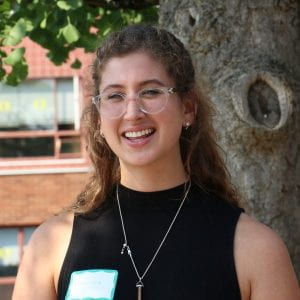Exactly one week after moving 2,969 miles across the country to serve as a RARE AmeriCorps member with Columbia Gorge Food Bank, I attended my first community event. At “Get Ready, The Dalles”, a resource round-up event held at the fire station for community disaster preparedness, we represented the food bank and shared low-cost options for preparing for a disaster. This was my first opportunity to meet community partners in The Dalles as well as interact with residents. Over eight months later, I realize that the event foreshadowed recurring themes of my work and the lessons I have learned on the job.
Shortly after arriving to set up the food bank’s booth, I started feeling intimidated: I was in a sea of tables and folding chairs, important-looking people with nametags, and heaps of fancy informational brochures. As “Community Outreach Coordinator” for the food bank, I really needed to know these people. I should memorize faces, names, organizations, titles; I should put myself out there and connect with local partners and community members. I figured that this was my plunge into the deep end. As it turns out, my introverted self is not great at this part. In my overwhelmed state I decided to stick strictly to the booth. I only ventured out to talk to my roommate Sarah, who was representing Wasco County Extension. I prepared a couple of lines to say in my best customer service voice as they stopped by the booth: “Hello! I’m with Columbia Gorge Food Bank. This is our resource guide for pantries in the area…”

I did meet many important partners that day, though I managed to immediately forget the names and titles of most of them. At one point, a man with sunglasses on and two kids stopped by. I gave them the entire rehearsed line about the food bank. The young girl next to him said excitedly, “My papa works for the food bank!” She pointed up at the man beside her. “Oh, really?” I said, “well that is great…” (good one, past Caitlin). The man chuckled, and my supervisor Sharon looked at me: “Caitlin, that’s Mike.” Mike was one of the food bank’s three (now four) other employees. I had seen Mike every day for the previous week and sit approximately five feet away from him at my desk. So, alright, noted, I wasn’t great at remembering names and faces. Turns out, I haven’t improved much in that category. I have learned how crucial it is because for building trust and making spontaneous, simple collaborations happen. I watch my supervisor strike up engaging conversations with most people who walk in the door. Within five minutes, they have exchanged business cards and have figured out how to pool resources for an upcoming project. It has been an extremely valuable lesson: networking and community-building make things happen, especially in rural areas. Things that I cling to, like emails, efficient meeting agendas, and customer-service-voice speeches about the food bank, can all be important, but they will not get you as far as old-fashioned trust.
Among the people stopping by our booth were kids and parents that I overheard speaking Spanish. An estimated 15% of Wasco County residents identify as speaking a language other than English, the most common being Spanish. Many community members are bilingual (English and Spanish) as well, so I never assume that someone does not understand English just because they are speaking Spanish. I felt a bit nervous, but confident that if I needed to explain something in Spanish, I could. There was one woman that stopped by and looked at our fliers, but she seemed a bit confused and hesitant when I started explaining the food bank resources. I asked if she preferred to speak Spanish. I switched over and explained the resources we had at the booth. She asked if we had any copies in Spanish. It was my first week on the job, but saying no to her stung. After that moment, I made it one of my priorities to translate our documents. Within the month, we had a version of our food assistance guide in Spanish for all three counties that we serve. It still sits at the front of my mind on our projects: Who are we excluding? How can we do better? Who is welcome and safe here?
As I look back to the event and the last couple of months in this position, one thing stands out to me as particularly shocking and unexpected. I was having an in-depth conversation about our food assistance guide with one person who came up to the booth. They seemed interested and engaged, asking questions and noting which pantries and meal programs they had heard about before. “You all are doing a fantastic job!” they proclaimed, “With all of these pantries open, I just don’t see how anyone could be going hungry. They could be going to a pantry every day of the week! When I see people on the side of the road here who ask for money because they are hungry, I just can’t believe it.” Ouch, I thought. I do not remember exactly what I said in reply as their comment was spinning around in my head. I tried to mention that not everyone had access to transportation, information, or time available to visit a pantry. I wish I had had a more direct answer.
At the food bank, we hear similar comments from people in our community on almost a weekly basis. There is a clear disconnect between people who have experienced challenges finding enough food or stable housing and people who have not. This disconnect creates and perpetuates myths that exist even among people who volunteer in our community. From what I have seen over the past eight months, these myths create an atmosphere of stigma and shame, which ends up being one of the biggest barriers to accessing assistance. That is why we have seen that pantries run by people who also use it, or have used it in the past, are some of the most successful pantries in our area. It is a scary thing to ask for help. Shame is a strong force that turns people away from accessing food assistance.

The main project in my work plan has evolved to be a storytelling project: to collect and share stories to dispel myths. We also want the people who are accessing the food bank’s services to feel listened-to, respected, and empowered, not ashamed or used. Unfortunately, comments from the person who stopped by our booth at my first event motivate me to collect and share people’s stories.
I realize that most of my time in RARE has been more about observing where I can and need to grow, rather than a period of dramatic growth. I can get better at networking; I can be an advocate for bilingual and culturally relevant resources in my workplace; I can focus on promoting understanding and empathy in my community. The skills that I have found I need to grow to be effective in my position have not been the traditionally “hard” skills that I learned in school or that were helpful in other work settings. Instead, the “softer” skills, like knowing what to say to keep a networking conversation going, have been invaluable. Reflecting on that first event, this program has thrown me into the fire, so-to-speak. Being burned a bit is all part of the process and will continue to be. It allows for new growth, a rewiring, new perspective.
 About the Author, Caitlin Seyfried: Caitlin grew up in Radford, Virginia and Greenville, North Carolina. She studied Environmental Science and Geography at the University of North Carolina Chapel Hill. In 2017, Caitlin traveled to Peru, Bolivia, Spain, and Mexico to observe informal food markets and WWOOF on rural farms as part of a travel scholarship from UNC. She is beyond excited to learn and grow in the RARE program, in her position at the Food Bank, and as a new resident in the Columbia River Gorge.
About the Author, Caitlin Seyfried: Caitlin grew up in Radford, Virginia and Greenville, North Carolina. She studied Environmental Science and Geography at the University of North Carolina Chapel Hill. In 2017, Caitlin traveled to Peru, Bolivia, Spain, and Mexico to observe informal food markets and WWOOF on rural farms as part of a travel scholarship from UNC. She is beyond excited to learn and grow in the RARE program, in her position at the Food Bank, and as a new resident in the Columbia River Gorge.
Does community development work interest you? Are you looking for a life changing experience in rural Oregon? Learn more about serving with the RARE AmeriCorps Program via our website: https://rare.uoregon.edu/application-process/member-application-process


